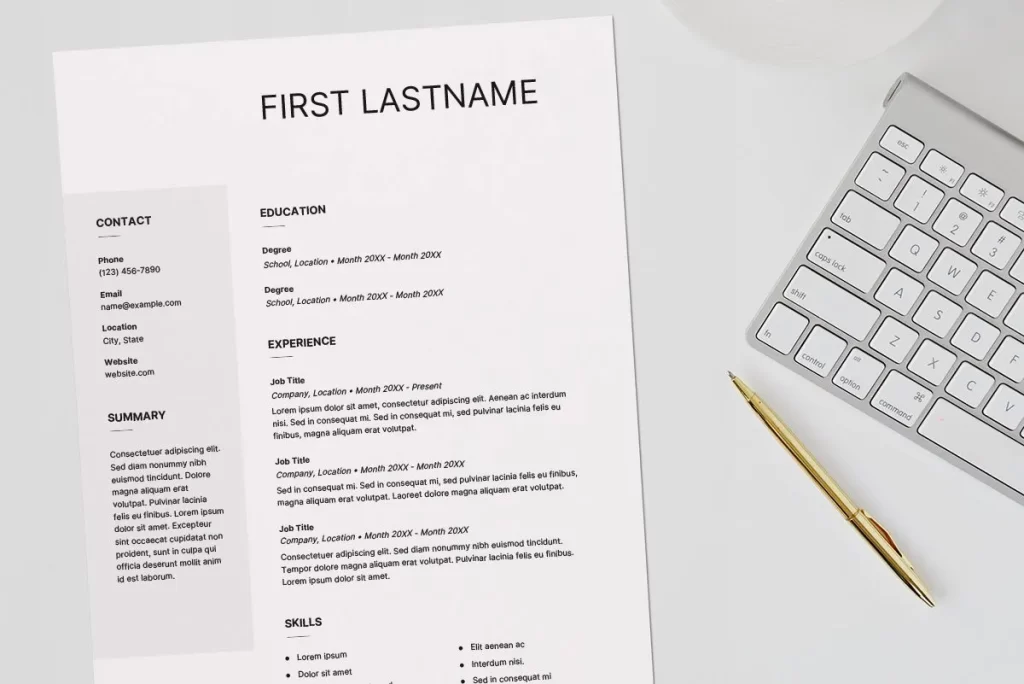
Knowledge & Skills on Resume
Here you can find out how to optimally design the “Knowledge and Skills” section of your CV. Please note two important rules so that you make a good impression with your application.
From Excel certificates to language holidays to a truck driver’s license: When designing your CV, you have a lot of freedom in terms of “knowledge and skills” – and that’s often where the difficulty lies. While the information about your education or your previous professional experience makes it pretty clear what information HR managers want to see, many applicants are initially at a loss here. Because in the course of life you acquire a lot of knowledge and skills, but by no means all of them should be mentioned in your CV.
Two basic rules for the “Knowledge and Skills” section
Before we devote ourselves to the usual focal points of this section (foreign languages, IT skills and driver’s licenses), we would like to note two central points . Ultimately, these two tips do not only refer to the area of ”knowledge and skills”, but are of enormous importance for the entire application :
When creating your application, keep in mind that the HR manager’s time is usually limited.
- The clearer , more concise and clearer you can bundle the crucial information, the better the impression your documents leave.
Those who provide precise and comprehensible arguments for employment score points. On the other hand, trivial matters eat up valuable time, do not underline your suitability and should therefore be avoided at all costs.

State foreign language skills in your CV
Although there are now better alternatives, self- assessment of one’s foreign language skills in the CV is still common. As a rule, these paraphrases are used, sorted from bad to good: basic knowledge, advanced knowledge, fluent in spoken and written, fluent in spoken and written, mother tongue. You can only call yourself a native speaker if you learned the language as a child – no matter how good your knowledge is. In the CV, the better knowledge is also listed first. So a common design would be:
Language skills : German (mother tongue), English (fluent in spoken and written), French (basic knowledge)
Better, because easier to compare and verifiable with a final certificate, is the classification according to the “ Common European Framework of Reference for Languages ” (CEFR). According to this convention, foreign language ability can be divided into six levels, starting with the lowest level:
- A1 and A2 (elementary language use),
- followed by B1 and B2 (independent language use)
- and finally C1 and C2 (proficient use of the language).
Language courses at universities or adult education centers are now generally tailored to this frame of reference and are completed with a corresponding certificate. However, mother tongues are still to be marked as such. In addition, practical experiences with the language may be noted:
Language skills : German (mother tongue), English (level C1), Spanish (level B2, practically deepened by a semester abroad in Seville, Spain)
There are also specialized tests for some languages that allow an even better assessment of language ability. For example …
- the well-known TOEFL test for English
- DELF for French
- DELE for Spanish
As a rule, however, these classifications are only required for jobs with a strong international connection – the fact that the employer wants a corresponding certificate is then usually explicitly mentioned in the job advertisement. They are therefore superfluous for the vast majority of employees.
EDP, computer or IT skills – what now?
Basic computer skills are mandatory in almost every industry today, because computer technology can be found in basically every workplace. Applicants therefore want to ensure that their CV demonstrates relevant knowledge. But that is often easier said than done. Because many stumble at the very first step: What is the correct generic term for these skills?
The abbreviation EDV, which stands for “electronic data processing”, has more or less become obsolete in this regard. It is reminiscent of Windows 95 and modems beeping and hissing for minutes. Even just randomly typing letters into a Word document is doing electronic data processing – and that’s certainly not what you want.
- The more open and broader generic terms “computer skills” or “ IT skills ” (the abbreviation IT stands for information technology) are therefore more appropriate.
Ultimately, these are all just different labels . What is really decisive for the HR manager is what facts are hidden behind it.
In contrast to language skills, however, no broadly accepted designation standards have yet emerged. The self- assessment remains customary , for example: basic knowledge, advanced knowledge, expert knowledge or solid, good or very good knowledge. The more precisely you can outline your skills, the better. In practice it could look like this:
IT skills : Very good knowledge of Microsoft Excel (experienced handling of macros, formulas and references) and SAP (focus on merchandise management), good knowledge of Microsoft Word (format templates and serial prints) and basic knowledge of Adobe Photoshop (composition of diagrams)
Here too, of course, you should only list the knowledge and skills relevant to the advertised position. Do not try to impress the recruiter with quantity – he is usually only interested in quality. You can therefore collect big bonus points with the relevant certificates and training courses that prove your IT skills.
If you present yourself as a supposed IT messiah in this section, you should also be prepared to be able to prove your advertised skills in an interview or in the assessment center . Lies are known to have short legs.

Include driver’s license in resume
Whether it is worthwhile for you to put your driver’s license on your CV depends heavily on the position you are applying for . Will you have to drive a car for work in the job – or rather not?
- It is very unlikely that a call center employee will be sent on a business trip in a car. A driver’s license is not required for this job and does not have to be cited. The situation is different for field workers: they can’t even do their job without a driver’s license.
From a purely formal point of view, it is clear relatively quickly who can score points with a driver’s license and who cannot. However, many applicants state that they have a driver’s license, although this is not essential for the job. After all, anyone who can drive a car is usually more mobile and flexible. Ultimately, the employer doesn’t care how you get to work – the main thing is that you’re on time. In most applications, the driver’s license remains a side note at most.
Of course, it is completely different with special driver’s licenses : a warehouse clerk usually needs a forklift license, a bus driver a bus driver’s license and so on. In any case, these must be listed for the relevant jobs because they are a prerequisite for carrying out the job.
State further and advanced training in the “Knowledge and skills” section?
no Of course, certificates and evidence that underpin your stated knowledge and skills are advantageous. They give your statements more credibility and make them more tangible. However, it can also be worth opening a separate section in your CV for further training and further education if these courses are of central importance for your professional qualifications.
Let’s take an industrial clerk as an example who works in purchasing or in the procurement of goods:
- Microsoft Excel is one of the programs he uses every day. It’s one of the tools he uses to do his job. With further training in this program, he can therefore demonstrate that he has mastered this tool. It lends more credibility to what he or she says in the “Skills and Skills” section of the CV and should therefore be mentioned there (including training title and completion date). However, there is no separate section for this training course. Because the hypothetical industrial clerk is not a good buyer just because he knows Excel.
- However, if he has learned in further training how to achieve better results in contract negotiations or how to prepare tailor-made needs analyses, then these should be listed in a special category for further and further training . After all, this knowledge increases his professional qualifications and makes him more attractive to potential employers. In this case, such courses are much more important than an Excel course and should be highlighted separately.
Finding a Job, CAREER PATHS, Communication and Networking, JOB HUNTING, Job Interview Tips, OTHER RESOURCES, Training and Development





